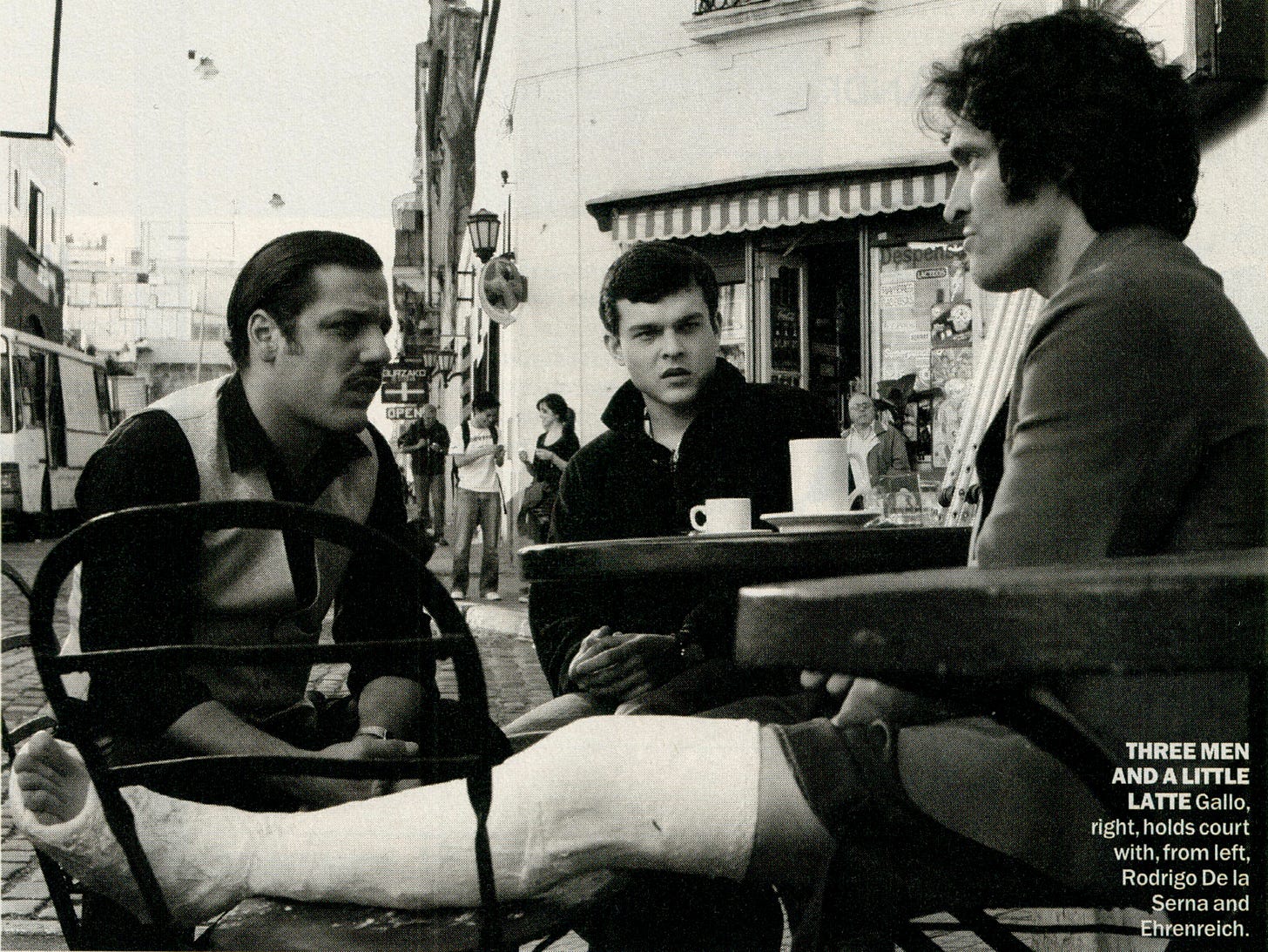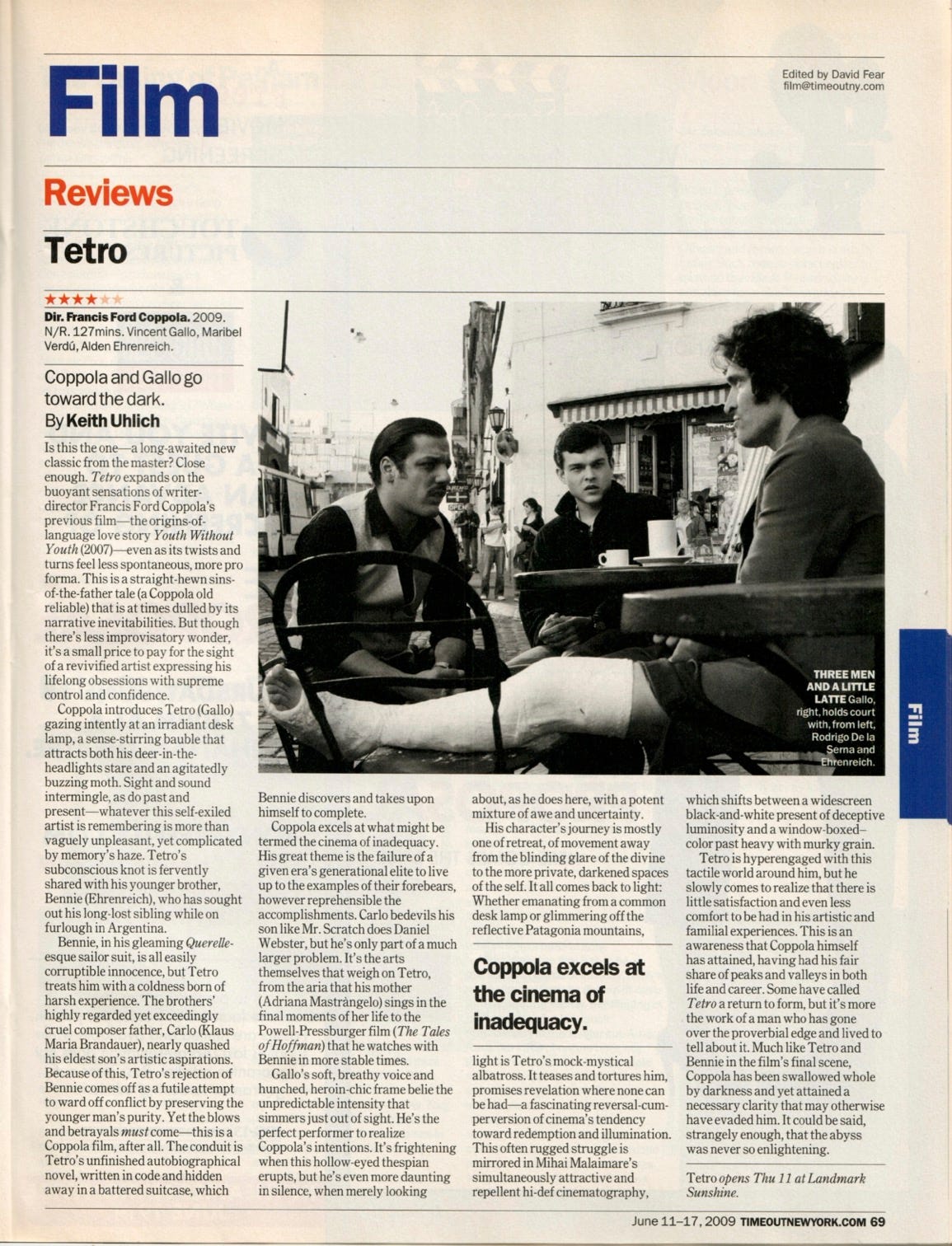Author’s Note: This is the only piece that, in originally published form, I would repudiate. Not for what I wrote (it’s best to own every word you commit to paper, no matter your feelings in retrospect), but for what I didn’t. In the magazine and on the website, the review begins with two sentences penned by Time Out’s then-E.I.C. at the last moment, issue-close deadline looming. (I won’t be reprinting them here—you can see them in the accompanying JPEG scan, or by clicking either the “Time Out” or “PDF” links below.) Those additions made it seem as if I thought Tetro’s director, Francis Ford Coppola, had been long in the wilderness, and this was close to a return to form.
This is antithetical to my feelings on Coppola, and on art generally. I don’t believe in a “return to form,” which was a large part of the reason I interrogate the term near the end of the review. Sometimes you jibe with where an artist is creatively and sometimes you don’t. But that’s on you, not them. If you find yourself out of sync for a while, and then your interest is rekindled, that’s because something fundamental has changed about you that squares with the path the artist is on. You meet at a crossroads, maybe to continue on together, maybe to diverge. This is the difference between approaching art as if it owes you something, or in a more humble frame of mind—which doesn’t mean you have to blunt your critical razor’s edge—where you judge each work as a specific emanation from a particular moment in time, one never to occur in the same way again. (I like to describe this ever-evolving creative synergy as “a confluence of collaborative events.”)
Anyways, yes, those first two sentences effectively tarnished the piece for me, and though I pleaded with the powers-that-be to have them excised, I was told they had to remain. I’ve removed those two sentences here and on Letterboxd. These are the versions I’d claim, and I’m happy the review is mine again. (08/13/2020)
★★★★☆☆
Dir. Francis Ford Coppola. 2009. N/R. 127mins. Vincent Gallo, Maribel Verdú, Alden Ehrenreich.
Tetro expands on the buoyant sensations of writer-director Francis Ford Coppola’s previous film—the origins-of-language love story Youth Without Youth (2007)—even as its twists and turns feel less spontaneous, more pro forma. This is a straight-hewn sins-of-the-father tale (a Coppola old reliable) that is at times dulled by its narrative inevitabilities. But though there’s less improvisatory wonder, it’s a small price to pay for the sight of a revivified artist expressing his lifelong obsessions with supreme control and confidence.
Coppola introduces Tetro (Gallo) gazing intently at an irradiant desk lamp, a sense-stirring bauble that attracts both his deer-in-the-headlights stare and an agitatedly buzzing moth. Sight and sound intermingle, as do past and present—whatever this self-exiled artist is remembering is more than vaguely unpleasant, yet complicated by memory’s haze. Tetro’s subconscious knot is fervently shared with his younger brother, Bennie (Ehrenreich), who has sought out his long-lost sibling while on furlough in Argentina.
Bennie, in his gleaming Querelle-esque sailor suit, is all easily corruptible innocence, but Tetro treats him with a coldness born of harsh experience. The brothers’ highly regarded yet exceedingly cruel composer father, Carlo (Klaus Maria Brandauer), nearly quashed his eldest son’s artistic aspirations. Because of this, Tetro’s rejection of Bennie comes off as a futile attempt to ward off conflict by preserving the younger man’s purity. Yet the blows and betrayals must come—this is a Coppola film, after all. The conduit is Tetro’s unfinished autobiographical novel, written in code and hidden away in a battered suitcase, which Bennie discovers and takes upon himself to complete.
Coppola excels at what might be termed the cinema of inadequacy. His great theme is the failure of a given era’s generational elite to live up to the examples of their forebears, however reprehensible the accomplishments. Carlo bedevils his son like Mr. Scratch does Daniel Webster, but he’s only part of a much larger problem. It’s the arts themselves that weigh on Tetro, from the aria that his mother (Adriana Mastràngelo) sings in the final moments of her life to the Powell-Pressburger film (The Tales of Hoffman) that he watches with Bennie in more stable times.
Gallo’s soft, breathy voice and hunched, heroin-chic frame belie the unpredictable intensity that simmers just out of sight. He’s the perfect performer to realize Coppola’s intentions. It’s frightening when this hollow-eyed thespian erupts, but he’s even more daunting in silence, when merely looking about, as he does here, with a potent mixture of awe and uncertainty.
His character’s journey is mostly one of retreat, of movement away from the blinding glare of the divine to the more private, darkened spaces of the self. It all comes back to light: Whether emanating from a common desk lamp or glimmering off the reflective Patagonia mountains, light is Tetro’s mock-mystical albatross. It teases and tortures him, promises revelation where none can be had—a fascinating reversal-cum-perversion of cinema’s tendency toward redemption and illumination. This often rugged struggle is mirrored in Mihai Malaimare’s simultaneously attractive and repellent hi-def cinematography, which shifts between a widescreen black-and-white present of deceptive luminosity and a window-boxed–color past heavy with murky grain.
Tetro is hyperengaged with this tactile world around him, but he slowly comes to realize that there is little satisfaction and even less comfort to be had in his artistic and familial experiences. This is an awareness that Coppola himself has attained, having had his fair share of peaks and valleys in both life and career. Some have called Tetro a return to form, but it’s more the work of a man who has gone over the proverbial edge and lived to tell about it. Much like Tetro and Bennie in the film’s final scene, Coppola has been swallowed whole by darkness and yet attained a necessary clarity that may otherwise have evaded him. It could be said, strangely enough, that the abyss was never so enlightening.
Tetro opens Thu 11 at Landmark Sunshine.



